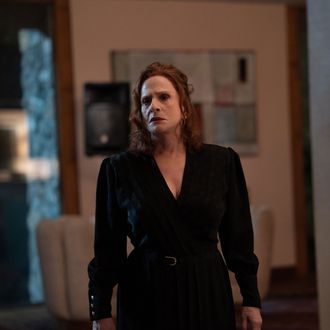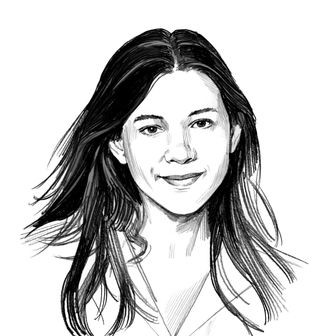
Beau Is Afraid isn’t Ari Aster’s first time at the parental-trauma rodeo. Hereditary is about mothers passing their baggage down to generations of spawn. Midsommar focuses on the deep grief of losing one’s family and looks askew at how we conceive, raise our young, and neglect our elderly. Beau is about the anxiety, guilt, and sexual repression stemming from a particularly overinvolved mother-son relationship. The two-hour-and-59-minute movie is the messy, colorful splatter canvas of a guy working through some shit. Aster casts Zoe Lister-Jones and Patti LuPone as young and old Mona Wassermann, an imposing figure who shares a bed with her tween son, surveils him at inappropriate times as an adult, stunts his development as an individual, and looms over every aspect of his life. She is the final boss of mommy issues. Literal-minded fans want to know, What’s the deal with Ari and his mom?
The abridged answer: nothing particularly fucked up.
Aster and his mom are just both drawn to exploring the darker sides of families as a theme in their respective art. Aster’s mother is Bobbi Lurie, a poet and visual artist who writes brooding material about illness, self, and her relationships with those most intimate to her and makes twisted illustrations to match. In a poem published in Eclectica in 2012, titled “My Son Works in the Museum of Intolerance,” she writes about Aster’s brother:
“Why was I ever born, Ma?” he asks me, as he always does. “Don’t you think the world would be better off if there were no people?”
“Yes.” He knows my answer.
“Why did you have me anyway?”
“Because you taught me what love is,” I say, as I always do.
“But isn’t that selfish?”
“Yes,” I say. I always say “yes.”
In a poem read on Garrison Keillor’s podcast, The Writer’s Almanac, called “The Perfect Black Blazer,” she describes the uncanny horror and pain of dealing with her aging mother.
I walked Mom to her chair,
watched the aides tie
bibs around the residents’ necks,
leaned to kiss
Mom gently good-bye on her cheek,
trying not to notice
she no longer smelled like
my mother.
Both Lurie and Aster are clearly fascinated by the relationships between mothers and children, though one processes them through poetry while the other uses beheadings and penis monsters. It doesn’t necessarily mean that what we see in Beau is based on some personal resentment; maybe it’s just a morbid fixation. Aster told Vox in 2018, “I have an amazing relationship with my parents and with my younger brother. I have incredibly supportive parents who are both artists. One reason I’m able to work on as dark a register as I often do is because I’ve never been made to question anything I was making by them.” So Aster’s mom raised him in such a secure environment that, ironically, he feels unafraid to illustrate fucked-up feelings about family in his work.
Aster says his mom — “a brilliant poet who used to be a brilliant visual artist” — nurtured and fostered his interest in film, particularly that “darker material.” As he told the Toronto Sun in 2018, “My mom and I would go to a lot of these movies together. I think my mom has a very dark outlook and a dark sensibility. So we’d go, when I was young, to see The Piano Teacher and Dogville together, and we both loved them.” When Aster put The Piano Teacher on his top ten for Criterion, he cited going to see it with his mom at age 14 or 15 and thinking, “I want to make movies like that.” In Beau Is Afraid, Beau tells his therapist that his mother acted betrayed if he ever developed any of his own interests as a kid. In reality, Aster seems to have had the opposite experience with his parents, repeatedly describing them as supportive of, and never questioning, his Oedipal and phallus-obsessed endeavors.
So Aster’s mom shares his artistic spirit and they love each other and he has never specifically mentioned her screwing him up, at least not beyond the normal ways that all families screw one another up. I was able to find at least one tenuous parallel between Beau and Aster’s life, though. While promoting Hereditary, Aster told The Verge, “My first experience in a movie theater was Dick Tracy … There was a scene with a guy with a Tommy gun and a wall of fire behind him. I panicked, screamed, and jumped out of my seat. And I ran six New York City blocks, running into the street and almost got hit by a bunch of cars, and had my mom chasing after a panic-stricken four-year-old.” Beau has a scene of adult Beau running panic-stricken through city streets, but it also has a flashback to a childhood incident at the mall, where he ran away and hid from his mother, sending her into hysterics. In the movie, the memory is weaponized by Mona as a sort of guilt-bomb against Beau. But running away or getting lost in public is also an archetypal experience for many children, and Aster does not describe his Dick Tracy episode as a source of familial shame or guilt rather than just his formative awe at movies. Like so many of the anxieties explored in Beau, the mall moment seems like one archetypal fear of many boys and men, broad in its resonance, just told from Aster’s idiosyncratic artistic viewpoint.
Maybe even the healthiest and most well-adjusted parent-child relationships are built atop some kind of wound; it’s how Beau starts, in a very literal way (umbilical cord, Freud … you get it). Maybe the artsier your parents are, the more room there is for acceptance and, conversely, to express angst, too. Or maybe Aster spent his earliest years in New York City and was therefore irrevocably psychotherapy-pilled for life. It’s kind of refreshing that under the fucked-up Oedipal-nightmarescape of his movies, he doesn’t paint his mother in interviews as a bogeyman or scapegoat. Or as a Mona. While speaking to the Playlist with Joaquin Phoenix, Aster insisted, “I have an incredible relationship with my mom,” and, simply, “Love my mom.” Then again, that sounds like something Beau would say too.


